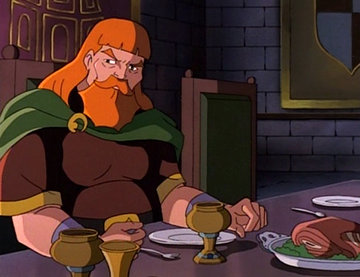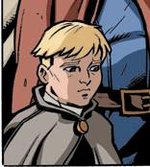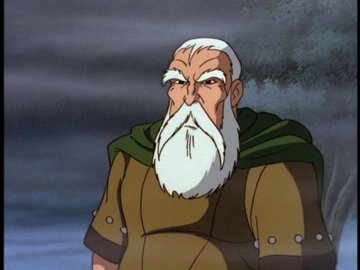Difference between revisions of "Bodhe"
(typos) |
Phoenician (talk | contribs) |
||
| Line 5: | Line 5: | ||
==History== | ==History== | ||
| − | {{CIT| | + | Bodhe was born {{CIT|in 985}} to [[Kenneth III]]. [http://www.s8.org/gargoyles/askgreg/search.php?qid=7994] As a boy, he fought beside his father at the [[Battle of Rathveramoen]] in 997, though he did not distinguish himself in the fighting, spending most of it fleeing from [[Gillecomgain]]. In the end, Kenneth, also known as "The Grim", defeated [[Constantine III]] and was crowned King and Bodhe survived to become a prince. ''("[[Tyrants]]", "[[Phoenix (episode)|Phoenix]]")'' |
[[Image:Bodhe3.JPG|thumb|150px|left|A younger Bodhe in 997]] | [[Image:Bodhe3.JPG|thumb|150px|left|A younger Bodhe in 997]] | ||
| − | Unfortunately, this did not last. {{CIT|A mere eight years later, [[Maol Chalvim II]] killed Bodhe's father and took the crown of Scotland. Bodhe survived this | + | Unfortunately, this did not last. {{CIT|A mere eight years later, [[Maol Chalvim II]] killed Bodhe's father and took the crown of Scotland. Bodhe survived this transition, but the experience deeply affected him.}} [http://www.s8.org/gargoyles/askgreg/search.php?rid=180] Bodhe had nearly lost his life as a young boy at the Battle of Rathveramoen and had seen many people die in the struggle. {{CIT|All of this seemed meaningless when his father was killed by his own cousin. Bodhe grew to feel a certain futility in battle, feeling that it caused nothing but death and destruction. This sentiment was amplified when Bodhe's own son, [[MacBodhe]], was killed in a political coup.}} [http://www.s8.org/gargoyles/askgreg/search.php?qid=9140] {{CIT|These experiences turned Bodhe into a man that would rather sue for peace or surrender outright then engage in battle, preferring to appease an enemy rather than to resist one, and some have seen this as cowardice.}} [http://www.s8.org/gargoyles/askgreg/search.php?qid=3475][http://www.s8.org/gargoyles/askgreg/search.php?qid=11982] |
{{CIT|Following the death of his father and son, Bodhe settled into a quiet life in Scotland, choosing not to oppose his father's killer.}} He instead focused on his friendship with [[Findlaech]] of [[Clan Moray]] and raising his daughter [[Gruoch]]. | {{CIT|Following the death of his father and son, Bodhe settled into a quiet life in Scotland, choosing not to oppose his father's killer.}} He instead focused on his friendship with [[Findlaech]] of [[Clan Moray]] and raising his daughter [[Gruoch]]. | ||
| Line 21: | Line 21: | ||
In [[1057]], Bodhe's actions helped bring about the tragic end to Macbeth and [[Demona]]'s alliance, when he urged Macbeth to forswear his pact with Demona and [[Demona's Clan|her clan]] in the hopes that Canmore's [[England|English]] followers - who had (so Bodhe believed) invaded [[Scotland]] only to destroy the [[gargoyles]] there - would return home. This led to Demona's betrayal of Macbeth and Canmore's subsequent victory. After Macbeth's "death," however, Bodhe declared his grandson Luach King of Scotland, and stood by him thenceforth. ''("[[City of Stone Part Four|City of Stone]]" Part Four)'' | In [[1057]], Bodhe's actions helped bring about the tragic end to Macbeth and [[Demona]]'s alliance, when he urged Macbeth to forswear his pact with Demona and [[Demona's Clan|her clan]] in the hopes that Canmore's [[England|English]] followers - who had (so Bodhe believed) invaded [[Scotland]] only to destroy the [[gargoyles]] there - would return home. This led to Demona's betrayal of Macbeth and Canmore's subsequent victory. After Macbeth's "death," however, Bodhe declared his grandson Luach King of Scotland, and stood by him thenceforth. ''("[[City of Stone Part Four|City of Stone]]" Part Four)'' | ||
| − | {{CIT|Presumably, he was slain alongside Luach fighting against Canmore the following year.}}[http://www.s8.org/gargoyles/askgreg/search.php?rid=752] | + | {{CIT|Presumably, he was slain alongside Luach fighting against Canmore the following year.}} [http://www.s8.org/gargoyles/askgreg/search.php?rid=752][http://www.s8.org/gargoyles/askgreg/search.php?qid=2366] |
==Appearances== | ==Appearances== | ||
| Line 33: | Line 33: | ||
==Real World Background== | ==Real World Background== | ||
| − | In real history, Bodhe was indeed Kenneth III's son and Gruoch's father, but we know little more of him beyond that. | + | In real history, Bodhe was indeed Kenneth III's son and Gruoch's father, but we know little more of him beyond that. [[Greg Weisman]] has pondered whether he may have slandered Bodhe "worse than [[William Shakespeare|Shakespeare]] slandered Macbeth." [http://www.s8.org/gargoyles/askgreg/search.php?qid=2366] |
==Production Background== | ==Production Background== | ||
Revision as of 20:13, 15 April 2015
Bodhe was a Scottish human. He was of royal blood and though he never wore the crown of King, both his father and grandson and numerous relatives were Kings of Scotland.
History
Bodhe was born in 985 to Kenneth III. [1] As a boy, he fought beside his father at the Battle of Rathveramoen in 997, though he did not distinguish himself in the fighting, spending most of it fleeing from Gillecomgain. In the end, Kenneth, also known as "The Grim", defeated Constantine III and was crowned King and Bodhe survived to become a prince. ("Tyrants", "Phoenix")
Unfortunately, this did not last. A mere eight years later, Maol Chalvim II killed Bodhe's father and took the crown of Scotland. Bodhe survived this transition, but the experience deeply affected him. [2] Bodhe had nearly lost his life as a young boy at the Battle of Rathveramoen and had seen many people die in the struggle. All of this seemed meaningless when his father was killed by his own cousin. Bodhe grew to feel a certain futility in battle, feeling that it caused nothing but death and destruction. This sentiment was amplified when Bodhe's own son, MacBodhe, was killed in a political coup. [3] These experiences turned Bodhe into a man that would rather sue for peace or surrender outright then engage in battle, preferring to appease an enemy rather than to resist one, and some have seen this as cowardice. [4][5]
Following the death of his father and son, Bodhe settled into a quiet life in Scotland, choosing not to oppose his father's killer. He instead focused on his friendship with Findlaech of Clan Moray and raising his daughter Gruoch.
In 1020, he was visiting Findlaech and his son Macbeth at Moray with Gruoch when the Hunter (who was secretly Gillecomgain) came to assassinate Findlaech. He did not act to aid his friend even when his own daughter ran to Findlaech and Macbeth's aid. ("City of Stone" Part One)
Some time later, he was willing to give Gruoch up in a loveless marriage to Gillecomgain (the man that nearly killed him decades earlier) when King Duncan ordered it to avoid conflict between his family and the crown. His daughter married Gillecomgain until his death at which point she wed Macbeth. Shortly after, Bodhe's grandson Luach was born.
In 1040, Duncan declared war on Clan Moray and Bodhe urged Macbeth to give himself up to Duncan in the hopes that Duncan would be merciful to Gruoch and Luach. ("City of Stone" Part Two, "City of Stone" Part Three) After Macbeth defeated Duncan in battle, Bodhe advised him to execute the young Canmore; however, Macbeth refused to do so. ("City of Stone" Part Three)
In 1057, Bodhe's actions helped bring about the tragic end to Macbeth and Demona's alliance, when he urged Macbeth to forswear his pact with Demona and her clan in the hopes that Canmore's English followers - who had (so Bodhe believed) invaded Scotland only to destroy the gargoyles there - would return home. This led to Demona's betrayal of Macbeth and Canmore's subsequent victory. After Macbeth's "death," however, Bodhe declared his grandson Luach King of Scotland, and stood by him thenceforth. ("City of Stone" Part Four)
Presumably, he was slain alongside Luach fighting against Canmore the following year. [6][7]
Appearances
- "City of Stone Part One" (First Appearance)
- "City of Stone Part Two"
- "City of Stone Part Three"
- "City of Stone Part Four"
- "The Gate"
- "Tyrants" (No Lines)
- "Phoenix"
Real World Background
In real history, Bodhe was indeed Kenneth III's son and Gruoch's father, but we know little more of him beyond that. Greg Weisman has pondered whether he may have slandered Bodhe "worse than Shakespeare slandered Macbeth." [8]
Production Background
Voice Actor: Ed Gilbert
See also
- Bodhe at Wikipedia, the Free Encyclopedia


